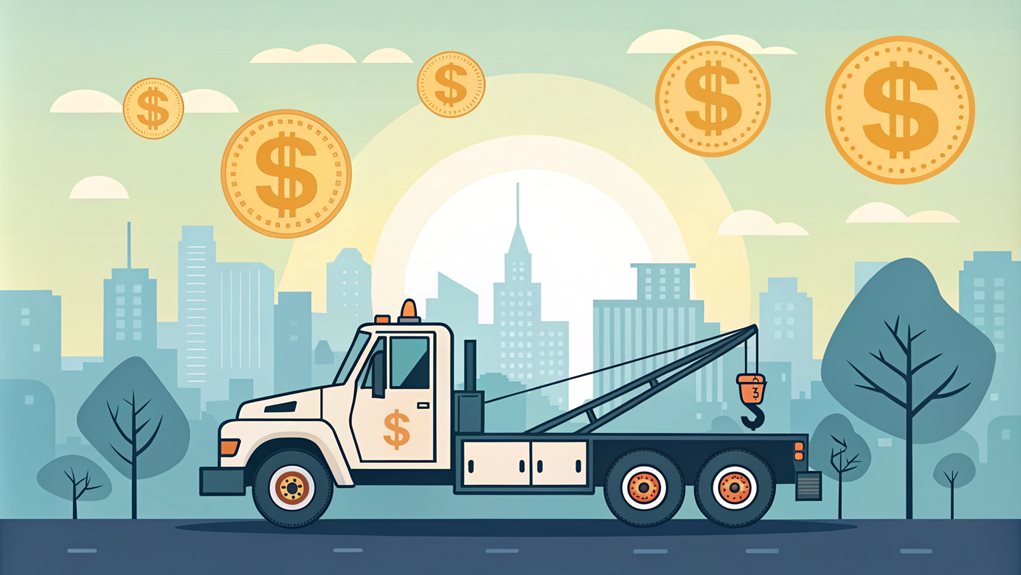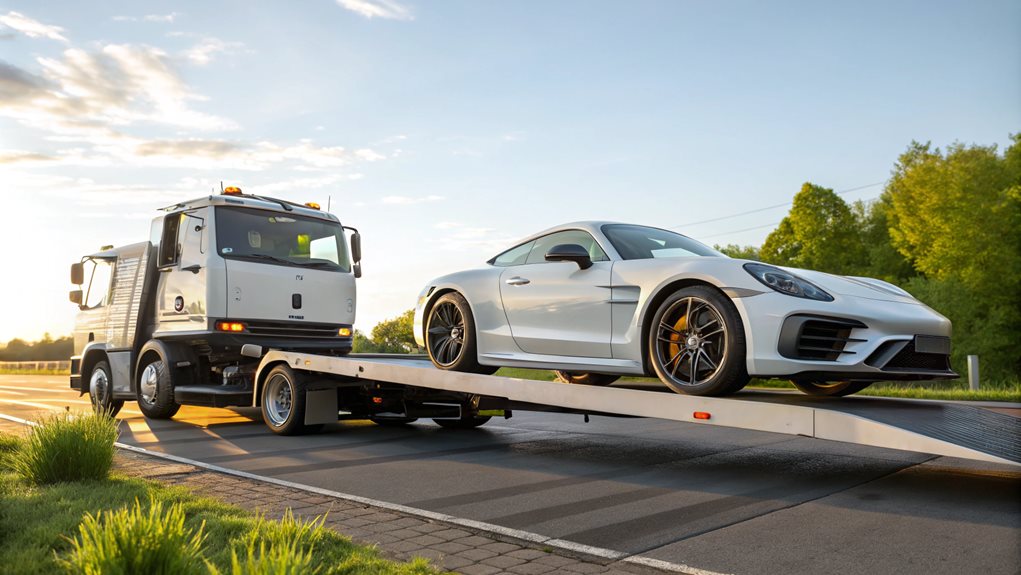Towing services are often misunderstood, with myths surrounding exorbitant costs, vehicle damage, and limited availability. However, the reality is very different. Basic towing fees typically range from $50 to $125 for initial distances, with professional services using advanced equipment like hydraulic lifts and flatbeds to guarantee vehicle safety. Towing operations are available around the clock, even during holidays, providing swift and reliable responses through efficient dispatch systems. Additionally, towing services cover a diverse range of vehicles beyond emergencies, including luxury models, while maintaining transparent pricing and robust community involvement. Unraveling these misconceptions showcases the extensive services provided.
Expert Highlights
- Towing costs are not exorbitant; fees range from $50 to $125 for initial distances, with mileage and administrative charges applicable.
- Advanced equipment like hydraulic lifts and flatbeds prevent vehicle damage during towing operations.
- Towing services are available 24/7, including holidays, with rapid response systems for quicker assistance.
- Towing services cater to diverse vehicle types using specialized equipment and trained professionals.
- Towing extends beyond emergencies, offering maintenance, transportation, and services for luxury and show vehicles.
Towing Cost Misunderstandings

Frequently, people encounter misunderstandings about the intricacies involved in towing costs due to various contributing factors. The complexity of these costs often stems from the base fee, typically ranging from $50 to $125 for the first 5 to 10 miles. An additional mileage charge of $2 to $7 per mile may apply if the distance exceeds this initial range.
Additionally, a hook-up fee is typically imposed, generally around $75, for attaching the vehicle to the tow truck. Time and day considerations substantially impact overall expenses, with higher fees applied for after-hours services and public holidays. Administrative fees can be incurred for non-standard towing times. For customers dealing with a flat tire, opting for a professional tire change service helps avoid costly and dangerous errors. Factors such as truck type and condition also play a significant role in determining the overall cost, as specialized equipment may be needed for larger or unique vehicles. Moreover, special circumstances, such as towing a unique or larger vehicle type, can lead to additional charges. Understanding these components can foster a sense of belonging within the community, as clarity alleviates concerns and misconceptions about towing services.
Ensuring Vehicle Safety
Ensuring vehicle safety during towing involves a combination of advanced towing equipment and secure transportation methods, both of which are essential in preserving the integrity of the vehicle and safeguarding the well-being of all road users. Modern tow trucks are equipped with state-of-the-art technology, such as hydraulic lifts and flatbeds, which allow vehicles to be transported without additional strain or damage. Additionally, extensive safety protocols, including the use of safety chains, integrated GPS systems, and regular equipment checks, are employed to guarantee that vehicles remain securely attached throughout the journey, minimizing the risk of accidents or complications. To ensure comprehensive care, the tow truck driver's assessment of the situation plays a pivotal role in determining the most effective and safest approach to towing. With the integration of real-time alerts to notify approaching drivers, towing professionals experience enhanced safety at roadside incidents. Emergency road services, like lockout assistance, ensure that vehicle owners quickly regain access to their cars without causing unnecessary damage, adding another layer of convenience and security.
Advanced Towing Equipment
Utilizing specialized equipment is paramount in advanced towing operations to certify vehicle safety. Robust winches, reinforced frames, and high-performance trailers enable efficient maneuvering and transport of oversized loads. Advanced suspension systems further stabilize heavy-duty tow trucks, while GPS tracking verifies accurate navigation and real-time monitoring during operations. Thorough training and detailed risk assessments equip towing professionals with the necessary skills to handle challenging scenarios safely. Additionally, specialized rigging and hoisting equipment play a crucial role in managing complex towing scenarios, ensuring that even the toughest tasks are completed smoothly. Safety harnesses, alongside reflective vests and gear, provide essential protection, while road flares and cones alert motorists to ongoing towing activities. Technological innovations, including hydraulic systems and state-of-the-art winches, streamline towing processes and enhance overall efficiency, ensuring that both vehicles and operators remain secure throughout every stage of transportation.
Secure Transportation Methods
Many factors contribute to guaranteeing vehicle safety during towing, and secure transportation methods play a critical role. Utilizing the right towing equipment, compatible with the vehicle's weight and size, guarantees stability and prevents damage. Compliance with manufacturer's towing recommendations maintains structural integrity. Regular checks for wear and tear in towing gear ensure reliability. Positioning equipment to maintain a level vehicle gesture mitigates swaying risks. Balanced load distribution enhances stability during transit. By placing heavier items near the hitch and guaranteeing even weight distribution, tilting is avoided. Safe driving practices such as increased following distance and careful maneuvering improve overall safety. Additionally, routine maintenance and pre-trip checks like tire pressure and light operations confirm all aspects are in perfect condition.
| Secure Setup | Balanced Loading | Safe Driving Practices |
|---|---|---|
| Proper vehicle securing | Distribute weights | Increase following distance |
| Inspect equipment | Even weight distribution | Use wide turns |
| Use safety chains | Secure items | Drive slowly and monitor |
Availability Around the Clock

Towing services operate tirelessly, offering assistance 24 hours a day, 7 days a week to guarantee drivers are never left stranded, regardless of time or day. This commitment is unwavering, extending through holidays and unconventional hours, ensuring that drivers find peace in knowing help is near.
The swift response capabilities of these services are geared towards minimizing vulnerability and reducing the inconvenience of unforeseen circumstances. With strategic dispatch systems, help often arrives much faster than other services, effectively alleviating stress.
These continuous operations not only deliver immediate solutions but also offer all-encompassing emergency resolutions, including roadside assistance, such as fuel delivery and jump-starts. This holistic approach underscores a dedication to driver safety and security, fostering a sense of community and trust. In Minnesota, 24-hour roadside assistance ensures comprehensive roadside services are available even in major cities and rural areas, highlighting a commitment to accessibility and reliability for all drivers.
Range of Vehicles Towed
Building upon the swift and reliable around-the-clock availability of towing services, their capability to accommodate a diverse range of vehicles further solidifies their role as indispensable allies on the road. This extensive capacity spans everything from compact sedans to mammoth RVs, including motorcycles, trucks, and specialty vehicles like luxury and show cars. Each vehicle towing scenario requires specialized equipment, such as flatbed and wheel-lift tow trucks, as well as heavy-duty machinery for larger transports. Customized securement devices guarantee safe and damage-free transportation, reflecting the meticulous training and proficiency of towing personnel. Towing services in the Twin Cities ensure prompt arrival of tow trucks, providing efficient and timely assistance to motorists in need.
| Vehicle Type | Equipment Used | Specialized Services |
|---|---|---|
| Cars | Flatbed Tow Trucks | Emergency Towing |
| Trucks | Heavy-Duty Equipment | Long-Distance Transport |
| Motorcycles | Securement Devices | Storage and Recovery |
| RVs and Boats | Wheel-Lift Tow Trucks | Non-Emergency Towing |
| Specialty Vehicles | Customized Trailers | Additional Services |
These services affirm the towing industry's commitment to every driver's sense of security and belonging.
Importance of Professional Towing

The importance of professional towing services is underscored by the expertise and thorough training that prevent potential vehicle damage and ascertain strict adherence to safety regulations. Skilled operators utilize advanced towing techniques and specialized equipment, optimizing the entire process to maintain vehicular integrity during transportation. By following proper towing protocols, these professionals not only safeguard the vehicle but also mitigate the risks associated with handling emergency situations, providing peace of mind to vehicle owners. Additionally, many towing companies offer 24/7 emergency car jump start service, ensuring that help is available anytime, anywhere in the Minneapolis – St. Paul area.
Expertise Prevents Vehicle Damage
Engaging a reputable and professional towing service is essential to guaranteeing your vehicle is transported without incurring any additional damage. Selecting a company renowned for its meticulous attention to detail, evidenced by good reviews and references, ensures that both their expertise and the right equipment are leveraged for your car's model.
This expertise guarantees that appropriate towing methods, like using dollies or flatbeds, are employed based on the vehicle type, safeguarding your car against further harm. Additionally, such companies are typically insured, providing peace of mind that any potential damage is covered.
Their seasoned experience, supported by a long history of successful, damage-free towing operations, underscores why placing your trust in these professionals greatly minimizes the risk of vehicle damage.
Training Ensures Safety Compliance
While expertise in the field of towing is paramount to preventing vehicle damage, it is the structured training programs that guarantee towing professionals adhere to stringent safety standards. Rigorous training, aligned with OSHA requirements and state DOT regulations, makes certain that tow truck operators meet the essential safety protocols, from equipment inspections to the proper use of safety gear.
Certification programs such as the TROCP and TRSCP set benchmarks, emphasizing accident prevention and regulatory compliance. All-encompassing training encapsulates real-world scenario practice, safety checklist completion, and effective traffic incident management. Continuous education, through refreshers and updates, keeps professionals informed of the latest industry standards. This extensive preparation not only bolsters individual competence but also cultivates a sense of community and trust within the towing industry.
Debunking Company Misconceptions
Many people hold misunderstandings about towing companies, often perceiving them as untrustworthy or only available during business hours. However, most towing businesses are reliable entities committed to providing high-quality service. Maintaining standards of professionalism and integrity is vital, as their reputation is contingent on every service call.
In places like Dinkytown MN, a vibrant student-heavy neighborhood, towing services offer around-the-clock help, ensuring assistance is always available due to the dynamic nature of the area.
Though a few disreputable operators exist, the majority maintain credibility and prioritize customer satisfaction. Additionally, towing services are not confined to standard working hours; many offer 24/7 assistance to address the unpredictability of breakdowns and accidents. With the aid of advanced technology like GPS and dispatch systems, these companies guarantee prompt responses even during weekends or holidays. Understanding these realities fosters confidence and trust in the towing industry's essential support.
Roadside Assistance FAQ
Can Towing Services Help With Lockouts or Jump Starts?
Towing services can indeed assist with lockouts and jump starts, offering expert technicians equipped with advanced tools to guarantee efficient service. Available 24/7, these services provide a sense of security for vehicle owners needing prompt roadside assistance.
What Should I Do if I Need a Long-Distance Tow?
For a long-distance tow, choose an experienced towing service with proper licensing, reliable reviews, and necessary equipment. Confirm 24/7 availability, understand costs and coverage, prepare documentation, and guarantee vehicle information is clearly communicated to the company.
How Are Towing Service Wait Times Usually Calculated?
Towing service wait times are usually calculated based on factors such as location, traffic conditions, weather, and specific service requirements. Efficient communication and digital processes guarantee accurate time estimations, fostering a sense of community and trust.
Do Towing Companies Offer Transportation for Passengers of a Disabled Vehicle?
Towing companies generally do not offer transportation for passengers of disabled vehicles. Their primary focus is on vehicle towing and roadside assistance, with passenger transport typically not provided, requiring individuals to arrange separate transportation independently.
Can Towing Services Handle Legally Parked Cars at Private Events?
Towing services can manage legally parked cars at private events under specific conditions, such as vehicles having multiple unpaid citations or violations related to registration. Compliance with local laws and obtaining proper authorization from property owners is essential.
